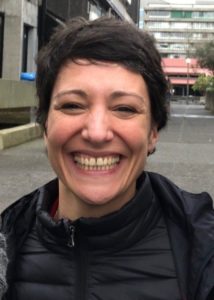 Melanie Kah is a Senior Lecturer at the School of Environment of the University of Auckland in New Zealand. She graduated with a MSc in Agronomy and Soil Sciences (University of Nancy, France), before completing her PhD at the University of York (UK). She was then recruited by the UK Food and Environmental Research Agency (FERA) where she assessed the exposure and hazard of a wide range of contaminants within projects commissioned by government and industry. After a couple of years, Melanie returned to academia and moved to the University of Vienna (Austria). This is where she started developing projects looking at the interactions between organic contaminants and natural/engineered nanoparticles, and nanopesticides in particular. Melanie was Distinguished Visiting Scientist at the CSIRO (2018, Australia) before moving to the University of Auckland in 2019.
Melanie Kah is a Senior Lecturer at the School of Environment of the University of Auckland in New Zealand. She graduated with a MSc in Agronomy and Soil Sciences (University of Nancy, France), before completing her PhD at the University of York (UK). She was then recruited by the UK Food and Environmental Research Agency (FERA) where she assessed the exposure and hazard of a wide range of contaminants within projects commissioned by government and industry. After a couple of years, Melanie returned to academia and moved to the University of Vienna (Austria). This is where she started developing projects looking at the interactions between organic contaminants and natural/engineered nanoparticles, and nanopesticides in particular. Melanie was Distinguished Visiting Scientist at the CSIRO (2018, Australia) before moving to the University of Auckland in 2019.
Read Melanie Kah’s Emerging Investigator Series article “Emerging investigator series: Nanotechnology to develop novel agrochemicals: critical issues to consider in the global agricultural context” and read more about her in the interview below:
Your recent Emerging Investigator Series paper focuses on Nanotechnology to develop novel agrochemicals: critical issues to consider in the global agricultural context. How has your research evolved from your first article to this most recent article?
I am an agronomist by training. I started my research career looking at conventional pesticides and in particular, how they behave in soil. When I started working in a group with a strong focus on nanotechnology-related research, I was immediately attracted by the idea of using nanotechnology to improve our current approaches for crop protection and nutrition. There was not much happening in this field when I started…and it is fantastic to see how much is going on now!
What aspect of your work are you most excited about at the moment?
I am excited to see the current wealth of enthusiasm and creativity around the applications of nanotechnology in agriculture, it is fascinating! Something I really enjoy is the opportunity to navigate across scientific communities that apply different approaches and have different perceptions. I find interactions with people outside of my own field very inspiring. I am currently exploring how social scientists can help increasing our impact by creating stronger engagement with a range of stakeholders. Transdisciplinary collaboration helps us to include end users at the earliest stages of development, recognise their values and co-design nano-enabled products that they really need and that they trust, and this is very exciting for me.
In your opinion, what are the most important questions to be asked/answered in this field of research?
This is a question that our paper intends to address. There are many scientific questions that need to be answered to advance the field, including those around the development of more powerful and accessible analytical techniques, or the improvement in our capacity to synthesize nanoparticles with new functionalities, for instance, particles that can respond to specific stimuli.
If we take a step back and consider the current environmental impact of the agri-food sector, we should also recognise that technology is not always the right avenue to improve efficiency and sustainability. Solutions are multi-faceted and highly context dependent. More work is needed to critically assess the performances of nano-enabled solutions (and other technologies) against the gains achieved by improved agronomic practices for instance, and how this plays out in a given social, economic and political context.
What do you find most challenging about your research?
Analytical challenges. I tend to work with organic nanoparticles that cannot be easily detected once in the environment and techniques that are used for metal or metal oxide nanomaterials are often unsuitable. We constantly face analytical challenges, especially because I like working with soil, which adds another layer of complexity.
In which upcoming conferences or events may our readers meet you?
Definitely, the Gordon Research Conference on Nanoscale Science and Engineering for Agriculture and Food Systems. The meeting was planned for June 2020 but it was cancelled due to the COVID-19 pandemic. The programme was fantastic including very high profile speakers. The meeting is rescheduled to June 2022 and I warmly recommend to attend! More information is available here. This is a great conference to meet a very friendly, multidisciplinary and inspiring community!
How do you spend your spare time?
The last couple months have been mainly home-based as New Zealand has taken very stringent lock down measures to respond to the COVID-19 pandemic. We had to invent many new indoor activities to keep our toddler entertained and had a lot of fun! I am now really looking forward to travel again and explore New Zealand with my family, do bush walks and discover the native wildlife.
Which profession would you choose if you were not a scientist?
I love travelling so perhaps a specialised travel agent for adventurers.
Can you share one piece of career-related advice or wisdom with other early career scientists?
Be kind, respectful and inclusive. Find sponsors and be a good sponsor to others when you can.










